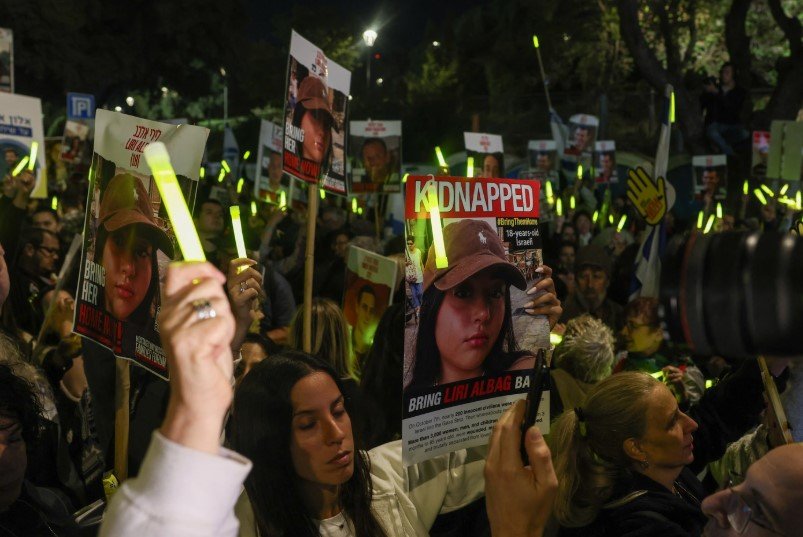Israel is now in a waiting game, as the Hamas delegation in Cairo contemplates its next move in response to the latest proposal for a ceasefire and hostage release. As families of Israeli hostages protest outside government offices, international pressure builds to secure a resolution.
The ongoing conflict between Israel and Hamas has persisted for over 18 months, with both sides entrenched in their positions. However, recent diplomatic efforts, particularly spearheaded by Egypt and Qatar with backing from the U.S., have opened the door for negotiations that may lead to a ceasefire. Israeli officials are cautiously optimistic, awaiting Hamas’s response to the latest terms, which include a potential demilitarization of Hamas under Egyptian supervision.
Pressure from All Sides: Israel’s Latest Proposal
The proposal, which surfaced from Israeli and Palestinian sources, suggests a critical next phase in the ongoing ceasefire-hostage release deal initially brokered in January. According to the Haaretz report, the plan involves Egypt taking a direct role in overseeing Hamas’s demilitarization process—a significant shift from previous discussions, which had struggled to make meaningful headway.
The main sticking point remains Hamas’s commitment to disarmament. The militant group’s delegation, now in Cairo for talks, is reportedly cautious about the current proposal. While it remains open to discussions, there is skepticism about reaching a final deal. Hamas is reportedly lowering its expectations for this round of negotiations, with internal discussions suggesting a deal could emerge by mid-May, aligning with a pivotal time for diplomatic efforts as U.S. President Donald Trump is set to visit key Arab nations in the region.

US Role: Fostering a Path to Peace?
The United States, while not directly participating in the talks, is playing a critical behind-the-scenes role in pushing the involved parties toward a breakthrough. The U.S. has promised Hamas a commitment that Israel will join future talks aimed at ending the war. This assurance is seen as a move to keep the negotiations on track, as both Israel and Hamas continue to fight for their respective interests on the ground.
Reports from the Ynet news site indicate that Israel is awaiting Hamas’s formal response, with diplomats hoping that the combination of international pressure and mutual interests might push the negotiations past their current impasse. However, Israel’s position remains firm—any peace deal must include Hamas’s demilitarization, as part of a long-term cessation of hostilities.
What’s at Stake: A Ceasefire Deal for Hostages
The stakes couldn’t be higher, especially for the families of those taken hostage by Hamas during the conflict. In Jerusalem, families have gathered outside government buildings to demand action. Their pleas reflect the desperation felt by many across Israel, as hostages remain in the hands of Hamas militants. These families are calling for Israel to not only secure the release of their loved ones but also to ensure that any ceasefire is sustainable and beneficial in the long term.
In addition to hostage releases, the ongoing talks are also focused on preventing further violence and reducing tensions in Gaza. The people living in the region, both Palestinians and Israelis, have endured immense suffering over the last year and a half, and any movement toward peace would be a welcome relief.
Egypt’s Role in Oversight: A Demilitarized Gaza?
As part of the latest proposal, Egypt has emerged as a central player, with reports suggesting it would oversee Hamas’s demilitarization. This would mean that Hamas would be expected to dismantle its military infrastructure, an ambitious goal that raises many questions. Would Hamas be willing to accept such terms, or would it see this as a step too far?
For Egypt, the proposal is both a challenge and an opportunity. As a regional power with deep ties to both the U.S. and Israel, Egypt is positioning itself as a stabilizing force. The idea of overseeing a demilitarized Gaza Strip would certainly bolster Egypt’s influence, but it also comes with significant risks, including possible backlash from factions within Hamas and other Palestinian groups.
The Road Ahead: Israel’s Next Move
As Israel waits for Hamas’s response, the country is preparing for various scenarios. Should Hamas agree to the deal, it would mark a turning point in the ongoing conflict. For Israel, this could be the first significant step toward ending the cycle of violence. But if the talks break down, Israel may find itself facing the same difficult choices it has dealt with throughout the war: continued military action or renewed negotiations.
In Jerusalem, the political class is divided over the best course of action. Some Israeli leaders believe that military pressure remains the only way to bring Hamas to the negotiating table. Others, however, see the current diplomatic window as an opportunity to end the war through political means.
What remains clear is that the clock is ticking. With U.S. President Trump set to visit the Middle East in May, the coming weeks may prove pivotal. His diplomatic efforts could help push both sides to agree on a long-term solution. However, as the ongoing protests by Israeli families of hostages demonstrate, the human cost of this conflict remains high.
